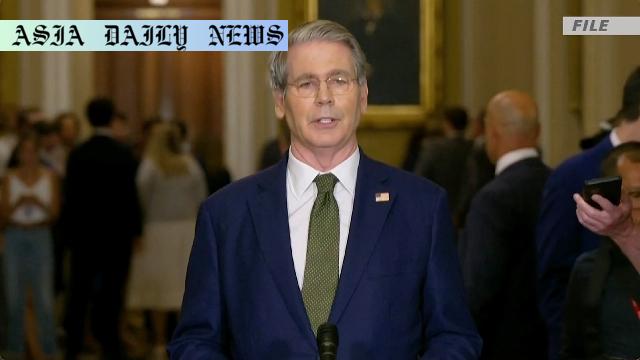Tariff Deal: Treasury Secretary Scott Bessent discusses extended deadlines as US pressures trading partners amid ongoing negotiations.
- – The US may extend its tariff deal deadline to finalize negotiations.
- – Treasury Secretary Scott Bessent reveals efforts to secure deals with 10-12 trading partners.
- – President Trump signaled flexibility regarding the July 9 deadline.
- – Talks with Japan are ongoing; US-Canada negotiations have stalled.

US Trade Negotiations: Extending the Tariff Deal Deadline
The United States, under President Donald Trump’s administration, has hinted at a strategic extension of the deadline for finalizing its trade agreements. Treasury Secretary Scott Bessent recently revealed in an interview that the administration is optimistic about securing deals with several key trading partners, particularly before Labor Day, September 1. The extension of the deadline is crucial, as it allows more breathing room for negotiators focused on aligning trade policies and tariff structures.
The trade negotiations have seen mixed progress. While the 90-day pause on Trump’s “reciprocal tariffs” formally concludes on July 9, Bessent’s remarks indicate the administration’s willingness to be flexible with the timeline. He noted that 18 nations are at the forefront of these talks and that they aim to finalize agreements with at least 10 or 12 by the current pause’s expiration date. Additionally, securing agreements with up to 20 trading partners by early September remains a significant objective for the administration, which views these deals as vital to improving America’s global trade positioning.
Challenges and Opportunities in Negotiations
While signaling flexibility, the US has also illustrated tough stances when dealing with specific partners. Bessent acknowledged that several countries feel “pressure” to complete these deals amidst fears of heightened tariffs. President Trump’s consistently aggressive trade rhetoric reinforces this sentiment. For instance, he recently announced the abrupt termination of discussions with Canada concerning the latter’s plan to impose taxes on US technology firms. Trump’s decision underscores his administration’s zero-tolerance approach toward perceived unfair practices.
Meanwhile, Japan is actively working towards securing an agreement with the US. Japanese Economic Revitalization Minister Akazawa Ryosei is leading ongoing discussions with Commerce Secretary Howard Lutnick in Washington. Their joint commitment to ironing out details reflects the high stakes, as both economies stand to benefit significantly from improved trade dynamics. However, the road to agreement necessitates thorough review and concession from both sides, illuminating why time extensions may be a pragmatic choice rather than a political maneuver.
The Bigger Picture: US Trade Policy and Global Impact
The broader picture of US trade policy under the Trump administration reveals an attempt to redefine global trade terms more favorably towards the US. With tariffs set at considerably higher levels and the imposition threat looming on various nations, the administration aims to leverage these negotiations for American economic gains. Trump’s public comments reflect this, as he expressed readiness to impose as high as 25% tariffs on nations that resist reaching an agreement.
Nevertheless, these policies have faced significant criticism. Some argue that the zero-tolerance approach risks alienating key allies and worsening global trade tensions. In particular, the breakdown of talks with Canada raises questions about long-standing partnerships and collaboration. On the other hand, supporters believe leveraging tariffs as a negotiation tool can yield favorable conditions, provided the administration manages its flexibility judiciously.
The upcoming months will be pivotal in determining the effectiveness of these strategies. Which countries will prioritize getting a trade deal signed, and at what cost remains a question hovering over international negotiations. However, the administration’s clarity in signaling readiness for extensions might provide negotiators with flexibility, potentially resulting in more balanced agreements for all stakeholders involved.



Commentary
The Strategic Depth of Extending Tariff Deadlines
The US administration’s decision to hint at extending the tariff deal deadline reveals a mix of strategic foresight and economic pragmatism. This approach allows flexibility to ensure thorough negotiations with key trading partners. Given the complexities involved in international trade agreements and the stakes for both sides, the willingness to extend deadlines indicates the administration’s intent to prioritize quality deals over rushed arrangements. This strategic flexibility can mitigate potential risks of hasty decisions while maximizing the benefits of the negotiations.
Balancing Aggression with Diplomacy
President Trump’s tough rhetoric, including the sudden halt of negotiations with Canada, demonstrates his administration’s no-nonsense approach. However, this strategy can be a double-edged sword. While such firmness may pressure counterparts into compliance, it risks alienating long-standing partners. Canada’s taxation on US tech firms is undoubtedly a sensitive issue, but abruptly closing dialogues may not be constructive in the long run. A holistic approach combining assertiveness with diplomatic efforts might bear better results in fostering trust and long-term cooperation.
Room for Improvement in Global Economic Policies
The global implications of these negotiations cannot be ignored. The US is not merely shaping its own economic prospects but also influencing worldwide trade policies. An extended timeline paired with balanced agreements could help in bolstering global economic stability. For Japan and other countries in discussion, the outcomes of these negotiations may serve as a blueprint for how smaller nations can align themselves with global economic powerhouses while protecting their interests. It’s not just about imposing tariffs but ensuring equitable competition and fostering innovation-driven trade dynamics over prolonged periods of collaboration.